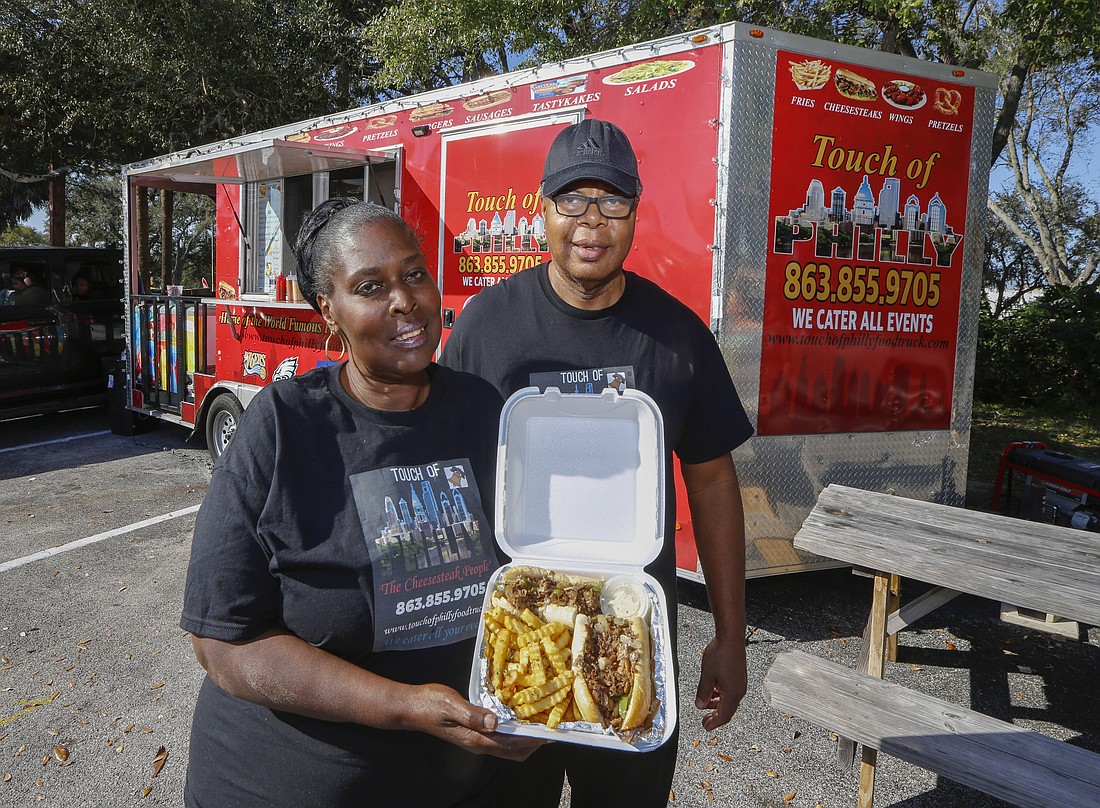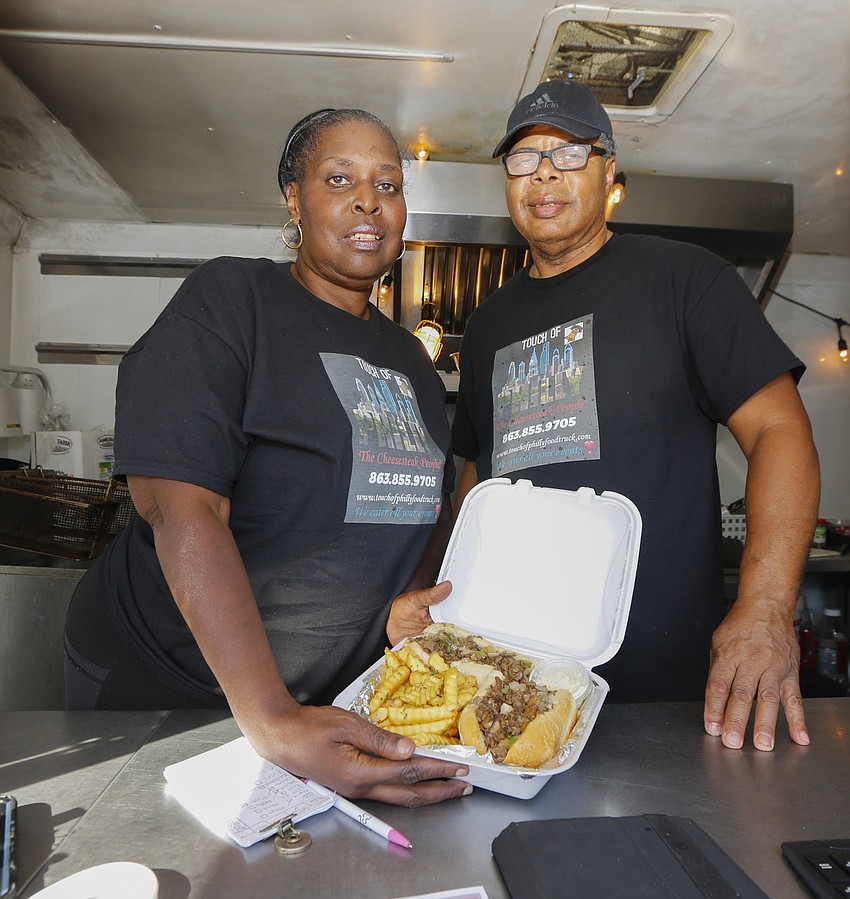- October 22, 2024
-
-
Loading

Loading

When Lenora Crawford walked into a Haines City Commission meeting in mid-January, she expected to clear up any problems she had with a needed permit for her food truck, "A Touch of Philly."
And she expected to be heard.
Instead, she says the commission of the Polk County city, about 60 miles east of Tampa, told her the city had instituted a "freeze" on new applications, and that soon a new city ordinance would install a near-total ban on food trucks — at the Feb. 1 meeting.
Crawford, 62 — one of several food truck operators Haines City is targeting — could not believe the city was enforcing an ordinance that hadn't even been passed.
"That's the crazy part of it," says Crawford. "They told me no."
So Crawford went home and unleashed her energy on Google. She found the Institute for Justice, a Virginia-based nonprofit public interest law firm that has worked to strike down bans on food trucks before. Now, a coalition of Polk County food trucks, a Florida food truck association and the institute have stalled the food truck ban after urging the Haines City Commission "to cease efforts to pass a near-total ban on food trucks and to allow all banned food trucks to resume operations."
The proposed ordinance applies even to food trucks that operate on private property, as Crawford's truck does. Under the ordinance, the trucks would have been forced to stop vending from those spaces or anywhere else in the city, according to the institute.
After Crawford got through, and after speaking to at least two food truck operators in mid-January, the Institute for Justice soon let Haines City know a food truck ban, in its opinion, violates Florida law as well as the Florida and U.S. constitutions.
Both the institute and Michael Blasco, head of the Florida Food Truck Association of Tampa, cite what they say is the plainest and largest problem for the Haines City: a 2021 deregulatory state law that preempts "mobile food dispensing vehicles" from local permits and fees.
That's because Florida's Department of Business and Professional Regulation does not want local governments asking for business licensing or permit fees that have already been paid to the state, Blasco says. Prior to the 2021 law, Blasco says it wasn't unusual for each municipality a food truck visited to ask for its own business tax receipt when those jurisdictions had no authority to do so.
The law in part, says a "municipality, county or other local governmental entity may not require a separate license, registration, or permit other than the license required (by the state)."
The state law also institutes its own ban — by prohibiting cities and counties from banning food trucks: "A municipality, county or other local governmental entity may not prohibit mobile food dispensing vehicles from operating within the entirety of the entity's jurisdiction."
Word of the coming Haines City ordinance initially had city staff declining to issue the necessary approval for new food trucks to legally operate — "effectively banning them from operating in Haines City," contends the Institute.
And the ordinance would also apply to existing food trucks, resulting in those trucks losing city permission to operate on Oct. 1.
A Jan. 16 memo from Richard Greenwood, development services director of Haines City, outlined the rules and stipulations of the ordinance. The memo was written for the Haines City mayor and city commissioners.
Greenwood spelled out what sounds like disdain the city has for food trucks in the memo, writing the ban/ordinance would "foster an environment that attracts economic opportunity and sustains economic viability. It has been found that mobile food vendors … are incompatible with permitted uses in the zoning districts and to the economic values generally within the districts. The City Commission hereby determines that it is in the best interest of the City to prohibit the issuance of business tax receipts for new mobile food trucks."
The memo adds that there will "be minimal impact to the FY 2023-2024 budget as Business Tax Receipts for food trucks are less than $37."
The five-member Haines City Commission voted to approve the ordinance during a first reading Jan. 16, and it was expected to vote it into law during a final reading on Feb. 1. But then Institute for Justice senior attorney Erica Smith Ewing called the city and told them the ordinance would violate state law.
On Jan. 30, Haines City attorney Fred Reilly sent a memo to the city commission asking for a delay of the second reading of the ordinance, in part to work on the language so as to avoid future litigation. On Feb. 1, the City Commission delayed the ordinance's final reading until Feb.14. (Reilly had asked them to delay a second reading until March 21.) The meeting will be preceded by a 6 p.m. workshop to discuss the ordinance.
Reilly, in an interview with the Business Observer, says the city initially passed food truck regulation in 2018. The state's deregulatory law, and some 2022 amendments to it, came after that. Reilly says he wants the commission to discuss its ordinance further so the latest Haines City food truck ordinance can be "harmonized" with new state law.
Reilly says cities have to tweak such ordinances all the time to match up with state law.
Haines City Mayor Roy Tyler did not return a message for comment from the Business Observer on the reasons for the food truck ban.
Haines City Commissioner Anne Huffman, in a response to an email from the Business Observer concerning the ordinance, replied: "How many of the food trucks in Haines City are 'mobile'? And of those, how many do you personally know are following the State of Florida Health Department regulations?"
Three other city commissioners did not respond to requests for comment.
Driving much of the angst in the debate is Haines City has already begun to enforce parts of the ban, even before it's official — causing some food trucks to shut down. That angered operators like Crawford and Gloribel Zamo, who operates a food truck that specializes in Peruvian and Asian fare.
"I found it highly unusual," says Zamo, 52, of Haines City. "They were already telling people no."
Zamo had a Haines City business tax receipt and was not shut down. But she opposed the ordinance and fears it will affect her in the fall. She says that as an amputee, she does not want to drive to a distant city elsewhere to operate, instead preferring the convenience of doing business in her hometown.
Crawford calling the Institute for Justice got the city's attention. The Institute, with a mission, in part, to "end widespread abuses of government power" says it has legal experience in the food truck and mobile vendor area, even in the Sunshine State. The Institute says it lobbied for the 2021 Florida law that protected food trucks from such local ordinances.

The Institute says it has spent decades fighting "to protect the right to earn an honest living, including winning two different U.S. Supreme Court cases on the subject." As part of its "National Street Vending Initiative," the organization says it defeated dozens of laws aimed at street vendors and food trucks, and notes legal victories in Florida, Georgia, Kentucky and North Carolina.
As for driving the food truck subsection of the state deregulation — an overall effort by Gov. Ron DeSantis and the Republican-led legislature to cut red tape — the Florida Food Truck Association of Tampa and other loose-knit food truck groups, says Blasco, led the way.
Blasco says Florida food truck operators, prior to deregulation, were weary of each city they drove into asking for money via a business tax receipt. "All the jurisdictions were hitting these food trucks up for permits that did nothing," says Blasco.
Even with the state deregulation, Blasco says he still hears of threatened local penalties of up to $500, but those fines are illegal if the food truck has a state business tax receipt.
And Blasco says that if municipalities like Haines City continue to ignore the 2021 law, he will contact Attorney General Ashley Moody.
Crawford, meanwhile, says she started her business after retiring to Davenport in Polk County from Philadelphia. She couldn't find a decent "Philly" cheesesteak anywhere, she says, so her husband began cooking them for the food truck.
Crawford, who has kidney failure, says the couple came to depend on the food truck for their income. She has been out of business in Haines City for three weeks, she says, and remains perplexed by the ban being in effect.
"How do you stop somebody's business, and it's not even a law?" says Crawford. "Give me my license."